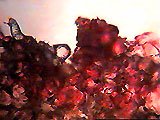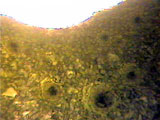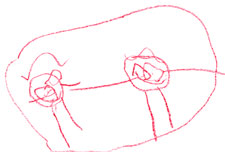
To be plain about it, our children do not have a mother. For that, many argue our family shouldn’t be.
As our boys well understand, there is, of course, a woman who carried them, and took care of them for the months before their birth. I love her like a sister, the children know her, and know our deep gratitude. We have a special name for her, but a ‘mother,’ to us, is a woman who parents you, who is emotionally tied to you, and, while many will want to say that, of course, our children have a mother, focusing on the biology, we reserve that word for those women who do the work of parenting. The reason should be more than evident to any adopted child, or any child, really, who takes the time to wonder what’s important in their relationship with their parents.
The detractors of our families are not stupid, though. Most people are raised by heterosexual couples and feel strongly for their parents. Our opponents apply a slight trick of vocabulary and emotion and this argument becomes one of the most effective they have. I’d bet even a lot of folks reading this, when they read that first sentence, cringed somewhere inside, and some even became morally incensed, for their reflexive extrapolation of their familial feelings into our home. I’ve got no problem with such reflex, as long as it doesn't end there. Heck, I love my mom too, and am sure my life’s quality would have been greatly diminished without her.
But it’s not just
a mom, a woman I love, right? I love
my mom. I love my particular parents. When you think on it beyond the superficial, it’s clear what we love about our parents is not their anatomy, or genes, not the ‘M’ or ‘F’ on their birth certificates. We love the people they are, their parenting. We’ve a whole tomb of loving history to back up our strong feelings about ‘mom’ and ‘dad,’ beginning even before our memory, in places where baby books can only testify. We love every patched scrape, every late night they worked for us or paced in an emergency room. We love every encouragement to go beyond ourselves, every hug, smile, and lesson imparted. Though no child cares from what anatomical shape all those experiences come, the words ‘mom’ and ‘dad’ still become infused with wonderful feelings by the association.
Our detractors, as low as it strikes me, try to turn those emotions into a weapon, to imply something that is false about our family. The implication being that only moms mother and only dads father, and so our children are only half parented, missing half all those many experiences. The implication is, for example, that when our boys fall down and scrape a knee that we both, both being their 1950’s stereotype of a father, turn to their teary faces and tell them to stop bawling; be a man.
I think, though, most modern humans would admit they parent for their child’s needs, aiming to make them moral, healthy, and happy individuals. Most fathers mother, at times, and most mothers father, when needed. Being a parent of twins, a necessity to parent in a way unique to each child is even more striking. I know my one son responds best to a gentle touch; the other is more rough and tumble. If treated with the same parenting stereotype of mothering
or fathering I’d be doing both a disservice. So when they’re hurt, we comfort them, and when they’re crying in forced drama, we encourage them to get back on the horse. Our parenting, just as it is in any other home, is a balance of the notions behind mothering and fathering, though never perfect (but if you think you do a perfect job as a parent, you're doing it wrong ;-)).
I’m reminded here of my Aunt Beanie, a very old woman who’s lost that part of the mind that would censor her younger self. After about 6 months of our children’s lives, she complained to my mom that, if anything, we “mother them too much.” She felt we kept them too close, and didn’t insist enough they “soothe themselves.” That was how they mothered in her generation. By today’s standards she’d be a very masculine parent. Heck, many of the kids back then, in the golden age of “the family,” were raised by their siblings, particularly here in Utah. I just find it funny that the only criticism of our parenting we’ve received from those who actually know us is that we mother too much :-).
It’s also bit comical that the folks who’ll deride gay men as unfit to be parents for their inability to do the traditional jobs of mothers are the same people who’ll complain about gay men being too feminine. One of the best things about being gay is being let go from those artificial gender rules. You can more easily do what you're innately best at, regardless of what's traditionally in your gender, and this carries over into our homes. Some lesbian moms can teach their kids how to through a curve ball better than any man, and some gay men make better cookies than the most domestic matriarch. We are lucky to have this freedom to more easily do what we're best at for our family, even if at the price of some alienation.
Personally, we have one of the best homemakers I’ve known, my Rob. In all, I have to conclude that it’s not really our actions of parenting, or our children's happiness about which our opponents are concerned; it’s about maintaining their stereotypes and superstitions about what it means to be gay, or a man, or a woman.
On this topic, it’s typically also stated that our children suffer from merely having little influence or example from adult females, and thus they won’t know how to build a family. In a way, with Rob as a stay at home parent and with our great involvement of extended family, it seems to me we’ve a better example of a traditional family than most around here. Furthermore, it's not like our family is a no-estrogen zone. Our kids spend much of their day with their female teachers and friends, almost every day they see their grandparents, and there’s an aunt or niece at our home almost as often . In short I’d say they’ve more access to examples of diversity in human sex, race, and family types than most kids in Utah. We’ve been sure of that
It’s not like they’ll hit puberty and have no idea how to treat or court a woman, or have no close female they could, if they felt it necessary for any reason, turn to for personal advice. Nevertheless, as a guy who’s been chaste and kept a strong union for well over a decade, I don’t feel abnormally unqualified to teach my children about what it means to court, love, cherish, and respect either a man or a woman, towards whichever their orientation may point. I know I learned much from my parents that’s been applied to our home (I also know most of those who use this argument offer their gay children far worse than no example, without a moral flinch).
And hey, as a bonus, the woman who marries one of our boys will get a man who knows work, at home and in the office, can be shared. Unlike some of the men in our family, they’ll know it is actually possible for a man to do his fair part with the cooking and laundry :-).
Finally here, a typical gay marriage opponent will resort to a variant of something like: “So you’re saying that mothers are disposable then?!!” Yes, that’s what I’m saying… Let’s get rid of mothers. My kids don’t have a sister either; so I advocate getting rid of them too, right? Sheesh! Does this mean the Catholics I’ve encountered using this argument by logical extension believe non-catholic parents are disposable as well?
To be clear, no one is saying that mothers or fathers are disposable; quite the contrary. I’ve never met a gay man or woman who’s had anything bad to say about mothers or fathers in general, or the institute of traditional marriage. It is simply politically effective for our opponents to use such hysterics, again playing on the emotions behind ‘mom’ and ‘dad.’ Ironic, though, that it is these same people who are arguing that either Rob or I should have been replaced to make their idea of ideal. It’s as though, to protect “the children,” they’re willing to ignore the reality of their attachments and needs of our children. No, the same strong emotions that make this argument effective for some are present in our home too, and deserve respect as well. Parents are vital, indispensable, and it’s tragic when they’re lost. But every child needs their particular family, the people bound to them emotionally and obligated to them as parents. No one else will do for my children; no one else will do for your children.
 I've been going the rounds over on Evan's blog about gay parenting. It's taken up all my blogging time and so I'll just link to it as my mid-week post :-).
I've been going the rounds over on Evan's blog about gay parenting. It's taken up all my blogging time and so I'll just link to it as my mid-week post :-).









 That’s him right there sleeping on my desk [forgive me as I trail off into indecipherable baby talk].
That’s him right there sleeping on my desk [forgive me as I trail off into indecipherable baby talk].









